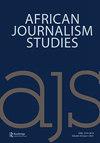非洲新闻研究:非洲新闻与媒体研究四十年
IF 1.8
3区 文学
Q3 COMMUNICATION
引用次数: 2
摘要
这本当时被称为《Equid Novi》的杂志在当时南非新兴的新闻和传播研究领域首次亮相已经40年了。所有人都认为,20世纪80年代是该国政治经济的动荡时刻,新闻业自然在调解这些动荡中发挥了关键作用,无论是好是坏。在学院内,新闻学、传播学以及媒体研究等较小程度的研究领域都相当蓬勃发展,其特点是所在的英语和南非荷兰语机构之间存在政治和意识形态分歧和争论。在这种背景下,Equid Novi不仅在学术界,而且在研究人员和新闻从业者之间,将自己展示为一个智力辩论和“辩论”的平台。当时还没有这样的平台。多年来,随着南非在1994年后重新融入非洲和全球政治经济,该杂志逐渐成为媒体研究领域的领先空间之一,越来越多地吸引了来自非洲大陆(包括中东和北非地区)的老牌和新兴研究人员。在本期周年纪念中,我们将发表有趣的研究文章和评论,内容包括对南非新闻和媒体研究/传播研究历史的反思、当前关于新闻非殖民化的辩论、当前虚假信息的祸害、媒体政策和监管的政治等。Keyan Tomaselli关于南非传播协会(Sacomm)的民族志不仅批判性地反映了南非最大的媒体和传播研究人员年度聚会的历史,还反映了学术期刊和学术学科协会之间自然联系的发展。作为南非传播学学科史上的关键人物之一,托马塞利的个人回忆提供了一个宝贵的窗口,通过这个窗口,现在和未来的南非和非洲媒体与传播研究的学生和学者可以一窥历史争论,形成学科发展的分歧和争论。与此同时——更重要的是——托马塞利谨慎地宣称自己的主观能动性,将自己的叙述描述为“就像汤里的苍蝇”,而不是假装成谚语中客观的“墙上的苍蝇”。本文章由计算机程序翻译,如有差异,请以英文原文为准。
African Journalism Studies: Mapping four Decades of African Journalism and Media Research
It has been four decades since this journal—then known as Equid Novi—made its debut on what was then a nascent field of journalism and communication studies in South Africa. By all accounts, the 1980s were tumultuous moments in the country’s political economy, and naturally journalism played key roles mediating these, for the better or worse. Within the academy, the disciplines of journalism, communication science and to a lesser extent fields of study such as media studies were fairly burgeoning, and were characterised by the political and ideological chasms and contestations between the English and Afrikaans institutions in which they were located. Against this background, Equid Novi presented itself as a platform for intellectual debate and “sparring”, not just within academe, but also between the researchers and journalism practitioners. No such platform existed at the time. Over the years, and with South Africa’s reintegration into the African and global political economy post-1994, the journal grew to become one of the leading spaces for research within media studies broadly, increasingly attracting both established and emerging researchers from across the African continent (including the MENA region). In this anniversary issue, we carry an interesting mix of research articles and commentaries that range from reflections on the history of journalism and media studies/communication studies in South Africa, the current debates on decolonisation of journalism, the current scourge of disinformation, the politics of media policy and regulation, and so on. Keyan Tomaselli’s autoethnography on the South African Communication Association (Sacomm) offers a critical reflection not just on the history of what has grown to become Southern Africa’s biggest annual gathering of media and communication researchers, but also the development of natural links between an academic journal of standing and an academic disciplinary association. As one of the key figures in the history of the discipline of communication studies in South Africa, Tomaselli’s personal recollection provides an invaluable window through which present and future students and scholars of South African and African media and communication studies catch a glimpse of the historical contestations, fissures and debates that shaped the development of the discipline. At the same time—and importantly so—Tomaselli is careful to declare his subjectivities, characterising his account as being “like being a fly in the soup” rather than pretending to be the proverbial, objective “fly on the wall”.
求助全文
通过发布文献求助,成功后即可免费获取论文全文。
去求助
来源期刊

African Journalism Studies
COMMUNICATION-
CiteScore
1.90
自引率
10.00%
发文量
18
期刊介绍:
Accredited by the South African Department of Higher Education and Training for university research purposes African Journalism Studies subscribes to the Code of Best Practice for Peer Reviewed Scholarly Journals of the Academy of Science of South Africa. African Journalism Studies ( AJS) aims to contribute to the ongoing extension of the theories, methodologies and empirical data to under-researched areas of knowledge production, through its emphasis on African journalism studies within a broader, comparative perspective of the Global South. AJS strives for theoretical diversity and methodological inclusivity, by developing theoretical approaches and making critical interventions in global scholarly debates. The journal''s comparative and interdisciplinary approach is informed by the related fields of cultural and media studies, communication studies, African studies, politics, and sociology. The field of journalism studies is understood broadly, as including the practices, norms, value systems, frameworks of representation, audiences, platforms, industries, theories and power relations that relate to the production, consumption and study of journalism. A wide definition of journalism is used, which extends beyond news and current affairs to include digital and social media, documentary film and narrative non-fiction.
 求助内容:
求助内容: 应助结果提醒方式:
应助结果提醒方式:


